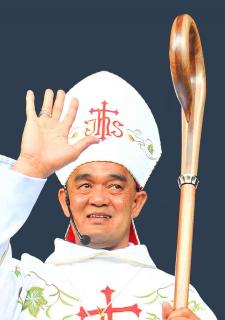 The Archbishop vs. the Prime Minister of Fiji
The Archbishop vs. the Prime Minister of Fiji
The Catholic Archbishop Chong was reprimanded by Prime Minister Bainimarama of Fiji for saying that the new constitution separating church and state would deprive Fijians of the right to worship in public. This is a common misrepresentation. However, Amnesty International has warned that this secular constitution still allows human rights violations. By itself, separation of church and state is not enough!
In September 2013 Catholic Archbishop Peter Loy Chong told the meeting of the World Association of Christian Communications in Suva that the new constitution's referral to religion as a personal matter threatened the right to practice religion in public. He also and said it would limit the church and render it voiceless in society. [1]
The Archbishop made these claims, despite the constitutional assurance that
Every person has the right, either individually or in community with others, in private or in public, to manifest and practise their religion or belief in worship, observance, practice or teaching. (Article 22..2)
And the other articles in the 2013 Fiji Constitution relating to religion sound equally non-threatening.
However, separation of church and state is still not sufficient to guarantee human rights, as is clear not only in the case of Communist countries, but also of Fiji. Amnesty International has warned that, despite its careful church-state separation, the new constitution drawn up by Fiji's military government fails to protect fundamental human rights. [2]
The current text upholds decrees that severely restrict free speech, grants the state the power to detain people (potentially indefinitely) without charge or trial in times of emergency. It also gives state officials immunity for a wide range of acts, including crimes under international law such as torture. [2]
Church-state separation is not an end in itself, but only as a means to prevent some kinds of human rights abuses. But it doesn't stop other kinds. As an Amnesty International spokesman said,
The new constitution not only erodes basic human rights for the people of Fiji, but grants military, police and government officials absolute immunity for past, present and future human rights violations. [3]
Fiji PM lashes out at head of Catholic Church
Island's Business, 2013-09-23
http://www.islandsbusiness.com/news/fiji/2990/fiji-pm-lash-out-at-head-of-catholic-church/
 SUVA, Fiji --- Fiji's Prime Minister, Commodore Voreqe Bainimarama has told religious leaders that they have a special responsibility not to spread misinformation and must uphold that responsibility.
SUVA, Fiji --- Fiji's Prime Minister, Commodore Voreqe Bainimarama has told religious leaders that they have a special responsibility not to spread misinformation and must uphold that responsibility.
He was reacting to a comment made by the Fiji’s Catholic leader, Archbishop Peter Loy Chong.
Such comments, the Prime Minister said, clearly had the potential to inflame public opinion.
The Archbishop had reportedly said that the Constitution deprived Fijians of the right to practice religious beliefs in the public sphere.
The Prime Minister, this was incorrect.
“Nowhere in the 2013 Constitution is there any limitation on expressing religious belief publicly, individually or in a group,” the Prime Minister said in a statement .
The Bill of Rights, the Prime Minister said, expressly guarantees a Fijian’s right to freedom of religion, conscience and belief and the right to freedom of expression.
Section 22 (2) clearly states “Every person has the right, either individually or in a community, with others, in private or in public, to manifest and practice their religion or belief in worship, observance, practice or teaching.”
This section could not be any clearer in its protection of the right to practice religion and to talk about and discuss religion in the public sphere.
The Constitution also protects the right of all Fijians to freedom of expression in all aspects of community life, including in the practice of religion. This right is only limited to prevent the spread of hate speech or incitement to violence.
“What’s more, the fact that the Archbishop is able to freely discuss the role of religion in public life, as he did in the media today, contradicts the very premise of his argument.”
On the secular state, the Prime Minister said that it was troubling that the Archbishop had misunderstood the Constitution’s provision on the matter.
“The Archbishop ought to be aware that the principle that underlines any Secular State is that the State cannot favour any specific denomination, belief or religion. A Secular State means that religion is a matter for people to decide for themselves, not for the State to decide for them.”
He said Section 4 of the Constitution establishes the Secular State. It protects the religious liberty of all Fijians in the State, and provides that religion and the State are separate.
“In this context, the statement that religious beliefs are personal means that they are not for the State to dictate. It means that the State cannot subscribe to a religious belief, force a religious belief on others, or regard a particular religion as the official religion of the State.” [...]
Notes
1. "Fiji PM hits back at cleric for comments on constitution", Radio NZ, 2013-09-23
http://www.radionz.co.nz/international/pacific-news/222534/fiji-pm-hits-back-at-cleric-for-comments-on-constitution
2. "New constitution fails to protect fundamental human rights", Amnesty International, 4 September 2013. http://www.amnesty.org/en/news/fiji-new-constitution-fails-protect-fundamental-human-rights-2013-09-04
3. Ibid
|
|








